


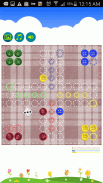
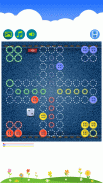
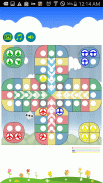

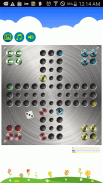
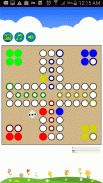
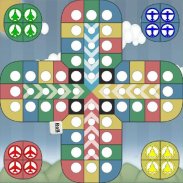


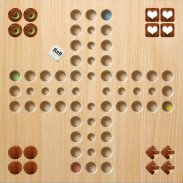
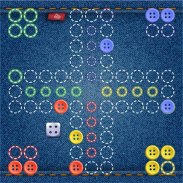
Ludo

توضیحات Ludo
Ludo یک بازی روی صفحه ای صلیب و دایره ای شبیه به patolli و Wahoo است که شامل جابجایی تعداد مشخصی از قطعات یا تیله ها در اطراف تخته ، تلاش برای وارد کردن آنها به منطقه ایمنی است.
بازی های Uckers و Chaupar نیز با تفاوت های کمی در قوانین شبیه لودو هستند.
Mensch یک بازی تخته ای است که در سال 1907 یا 1908 توسط ژوزف فردریش اشمیت در آلمان ساخته شده است.
این بازی در سال 1914 منتشر شد و حدود 70 میلیون نسخه فروخته شد که با استقبال گسترده مردم سربازان آلمانی در جنگ جهانی اول روبرو شد این یک بازی صلیبی و دایره ای است که دایره ای که روی صلیب فرو رفته است ، شبیه به بازی هندی Pachisi ، بازی کلمبیایی است. Parqués ، بازی اسپانیایی Parchís بازی های آمریکایی Parcheesi (Parchisi) ، Aggravation و Trouble the English English Ludo.
قوانین بازی Ludo:
- تعداد بازیکنان: 2 تا 4
- هدف: اولین بازیکنی که می تواند تمام قطعات خود را از ناحیه شروع ، اطراف تخته و به خانه منتقل کند.
- تنظیم: یک بازیکن باید 6 عدد را پرتاب کند تا یک قطعه از دایره شروع به قسمت اول مربع در مسیر منتقل شود. و پرتاب 6 به نوبت دیگری می رسد.
- بازی: بازیکنان به نوبه خود در جهت عقربه های ساعت حرکت می کنند. بالاترین پرتاب قالب آغاز می شود.
هر پرتاب ، بازیکن تصمیم می گیرد که کدام قطعه را حرکت دهد. قطعه ای که به سادگی در یک جهت عقربه ساعت در اطراف مسیر حرکت می کند که توسط تعداد پرتاب شده داده می شود. اگر هیچ قطعه نمی تواند به طور قانونی با توجه به تعداد پرتاب شده حرکت کند ، بازی به بازیکن بعدی منتقل می شود.
اگر قطعه ای روی قطعه ای از رنگ دیگر فرود بیاید ، قطعه پرش از آن به دایره شروع خود باز می گردد.
اگر قطعه ای روی قطعه همان رنگ فرود بیاید ، این بلوک را تشکیل می دهد. هر قطعه مخالف نمی تواند این بلوک را تصویب یا فرود بیاورد.
- برنده شدن: هنگامی که یک قطعه از تابلوی شکل گرفته است ، ستون خانه را ادامه می دهد. قطعه فقط با یک پرتاب دقیق روی مثلث خانه قابل جابجایی است.
نفر اول که تمام 4 قطعه را به مثلث خانه منتقل کرد ، برنده می شود.



























